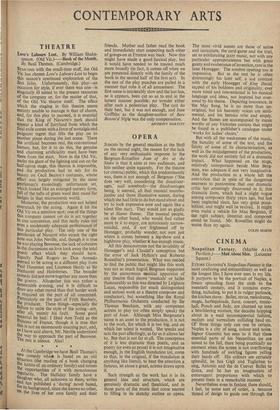CONTEMPORARY ARTS
Love's Labours Lost. By William Shake- speare. (Old Vic.)—Book of the Month. By Basil Thomas. (Cambridge.)
STARTING with the small-time stuff, the Old Vic has chosen Love's Labours Lost to begin this season's continued exploration of the first folio. Unfortunately, this play—an occasion for style, if ever there was one—is Singularly ill suited to the present resources of the company or, for the matter of that, of the Old Vic theatre itself. The effect Which the staging in this theatre seems entirely unable to manage is that of charm, and, for this play to succeed, it is essential that the King of Navarre's park should appear a kind of fairyland from which the final exile comes with a force of nostalgia and Poignant regret that lifts the play on to another plane during the last scene. There the artificial becomes real, the conventional human, but, for it to do this, the genuine and charming artificiality must have been there from the start. Now in the Old Vic, tinder the glare of the lighting and out on the half-apron stage, this illusion is impossible, and the production had to rely for its beauty on Cecil Beaton's costumes, whose effect was largely mitigated by the same gentleman's exceedingly unfortunate set, Which looked like an enlarged nursery farm, full of the tufts of green wool that stand for hedges in that microcosmic world.'
Moreover, the production was not helped
overmuch by the acting. Again it hit the Old Vic on a sensitive spot; one of the things this company cannot yet do is act together in one convention, and this really rules out even a moderately adequate performance of this particular play. The only one of the gentlemen of Navarre who struck the right Rote was John Neville, and, though it is true he was playing Berowne, the lack of cohesion In the discussions on love took away the total Poetic effect which they should have. Equally Paul Rogers as Don Armado _seemed to be acting in a different play from Paul Daneman and Laurence Hardy as Sir Nathaniel and Holofernes. The broader comedy did not move together any more than the poetry. Altogether this was rather a lamentable evening, and it is difficult to draw any other moral than that harder work is required on the part of all concerned. Particularly on the part of Frith Banbury, the producer. These things—especially the failure to unite the style of the acting—are, after all, mainly his fault. Some good Material he had: I liked Ann Todd as the Princess of France, though it is true that this is not an enormously exacting part, and, as I have said above, Mr. Neville understood the way to approach the part of Berowne. The rest is silence. Alas!
• • •
At the Cambridge we have Basil Thomas's new comedy whioix is based on an old situation (the reading of a book changing the habits of an ordinary family) and misses thc opportunities of it with monotonous regularity. The Halliday family have a daughter who, all unknown to them, writes „and has published a 'daring' novel based, lor its background, since she knows no other, on the lives of her own family and their friends. Mother and father read the book and immediately start suspecting each other of goings-on at Frinton way back. Now this might have made a good farcical play, but it would have needed to be treated much more broadly (in fact, it comes off when we are presented directly with the family of the book in the second half of the first act). In the rest of the play punches are pulled in a manner that robs it of all amusement. The first scene is intolerably slow and the last has, so it appears, been cut so as to end in the lamest manner possible: no wonder either after such a pedestrian play. The cast do their best, but it was not enough, and Jane Griffiths as the daughter-author of Bare Bosom'd Nigh/ was the only compensation.
ANTHONY HARTLEY


































 Previous page
Previous page